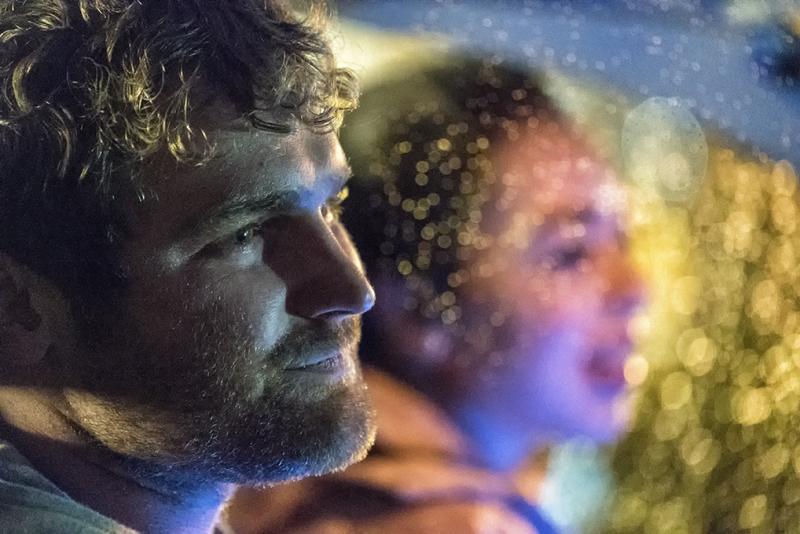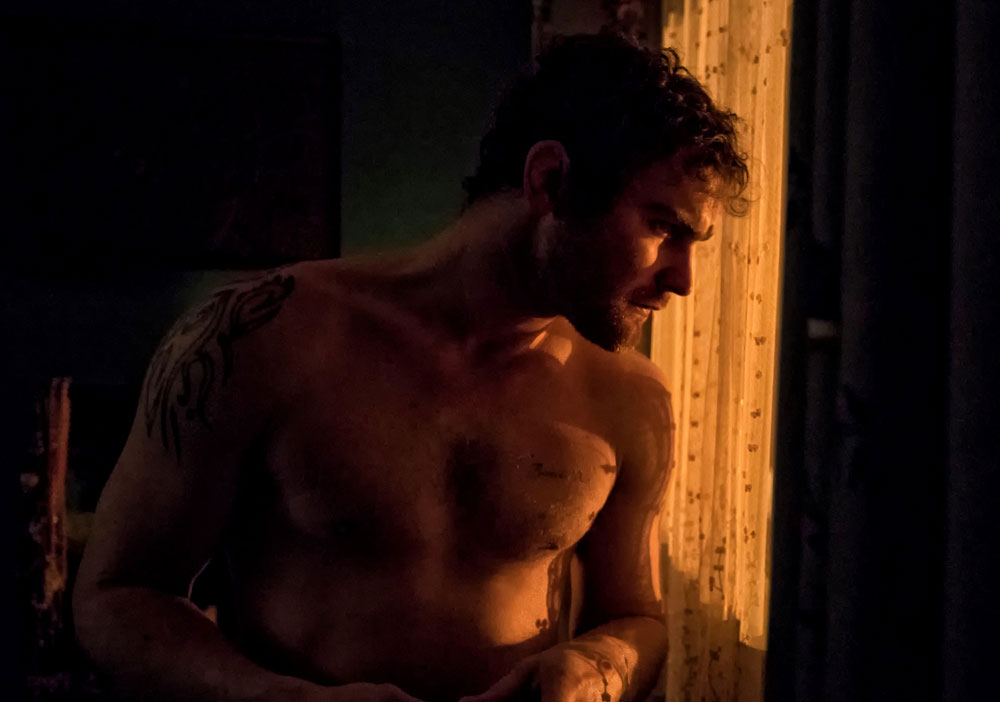Run review – wheels on fire in Scotland | reviews, news & interviews
Run review – wheels on fire in Scotland
Run review – wheels on fire in Scotland
Dreams of leaving flavored by Bruce Springsteen's 'Born to Run'

Run is the story of disgruntled 36-ish Finnie (Mark Stanley), a big, dour worker in a fish processing plant in the Aberdeenshire port of Fraserburgh – writer-director Scott Graham’s hometown.
The film completes Graham’s trilogy about ordinary people yearning to escape their constricted lives. Like Shell (2012) and Iona (2016), it’s a raw drama with a small cast that uses its physical setting to evoke its protagonist's conflicts – the issue of existential choice being central to Graham’s potent filmmaking. The alienating landscape here is a circle of sodden streets and a wave-smashed harbor road that Finnie (Stanley, pictured below) scorches one filthy night in the unsuspecting Kid’s souped-up car, drag-racing being the thrill-seeking, authority-flouting habit of his youth, and Kid's, too.
 What’s most subversive about Finnie’s acting out in this way is his allowing Kid’s disaffected pregnant girlfriend Kelly (Marli Siu) – who gets in the car thinking Kid’s behind the wheel – to come for the ride. Finnie fears that Kid is making the same mistakes he made in narrowing his opportunities – if mistakes they were – but his seeing in Kelly a kindred spirit is delusional and potentially disastrous. As for Kelly, she has some of the ache, if not the fire, that drives the Glaswegian Rose (Jessie Buckley) to contemplate abandoning her responsibilities in last year's Wild Rose.
What’s most subversive about Finnie’s acting out in this way is his allowing Kid’s disaffected pregnant girlfriend Kelly (Marli Siu) – who gets in the car thinking Kid’s behind the wheel – to come for the ride. Finnie fears that Kid is making the same mistakes he made in narrowing his opportunities – if mistakes they were – but his seeing in Kelly a kindred spirit is delusional and potentially disastrous. As for Kelly, she has some of the ache, if not the fire, that drives the Glaswegian Rose (Jessie Buckley) to contemplate abandoning her responsibilities in last year's Wild Rose.
The frequent closeups of the brooding Finnie and the stormy atmosphere – beautifully rendered by Simon Tindall’s cinematography – render the film the subjective experience of a man who’s an enigma to himself. Dwelling on Finnie’s relationships with Kid and Kelly and his desire for the future they appear to be throwing away, Run neglects the meaty stuff of his marriage, which would have beefed up a movie that feels slight at 88 minutes. Manson has limited screen time, but her evocation of Katie as a realistic, resilient woman who hasn’t let her humdrum life in Fraserburgh sap her optimism or her vitality implies that Finnie’s shrinking from her when she invites him to have sex is regressive. Stanley's reticent performance contains such possibilities; he and Manson are well-matched, and Siu is strong, too, as a young women whose prime need is obvious.
"Run" comes from Bruce Springsteen’s Born to Run, both the 1975 album and its title anthem of supercharged motorized escape, which Graham quotes in written words at the start. His likening of Fraserburgh to Freehold Borough, the declining New Jersey manufacturing town – or "Badlands" – of Springsteen’s childhood is persuasive. Finnie and Katie were evidently Springsteen fans because they got "Born to Run" tattoos when they were kids, the slogan proving only skin deep. Before his night turns crazy, Finnie sheepishly announces he's going to listen to his “old records" alone. In his funk, he should have given Springsteen’s “Happy” a spin: “Lost and running 'neath a million dead stars/ Tonight let's shed our skins and slip these bars/ Happy in each other's arms/ Happy, baby, come the dark”. That's something to run toward.
rating
Explore topics
Share this article
The future of Arts Journalism
You can stop theartsdesk.com closing!
We urgently need financing to survive. Our fundraising drive has thus far raised £49,000 but we need to reach £100,000 or we will be forced to close. Please contribute here: https://gofund.me/c3f6033d
And if you can forward this information to anyone who might assist, we’d be grateful.

Subscribe to theartsdesk.com
Thank you for continuing to read our work on theartsdesk.com. For unlimited access to every article in its entirety, including our archive of more than 15,000 pieces, we're asking for £5 per month or £40 per year. We feel it's a very good deal, and hope you do too.
To take a subscription now simply click here.
And if you're looking for that extra gift for a friend or family member, why not treat them to a theartsdesk.com gift subscription?
more Film
 London Film Festival 2025 - crime, punishment, pop stars and shrinks
Daniel Craig investigates, Jodie Foster speaks French and Colin Farrell has a gambling habit
London Film Festival 2025 - crime, punishment, pop stars and shrinks
Daniel Craig investigates, Jodie Foster speaks French and Colin Farrell has a gambling habit
 I Swear review - taking stock of Tourette's
A sharp and moving tale of cuss-words and tics
I Swear review - taking stock of Tourette's
A sharp and moving tale of cuss-words and tics
 A House of Dynamite review - the final countdown
Kathryn Bigelow's cautionary tale sets the nuclear clock ticking again
A House of Dynamite review - the final countdown
Kathryn Bigelow's cautionary tale sets the nuclear clock ticking again
 theartsdesk Q&A: Idris Elba on playing a US President faced with a missile crisis in 'A House of Dynamite'
The star talks about Presidential decision-making when millions of lives are imperilled
theartsdesk Q&A: Idris Elba on playing a US President faced with a missile crisis in 'A House of Dynamite'
The star talks about Presidential decision-making when millions of lives are imperilled
 Urchin review - superb homeless drama
Frank Dillane gives a star-making turn in Harris Dickinson’s impressive directorial debut
Urchin review - superb homeless drama
Frank Dillane gives a star-making turn in Harris Dickinson’s impressive directorial debut
 Mr Blake at Your Service review - John Malkovich in unlikely role as an English butler
Weird comedy directed by novelist Gilles Legardinier
Mr Blake at Your Service review - John Malkovich in unlikely role as an English butler
Weird comedy directed by novelist Gilles Legardinier
 Don't Let's Go to the Dogs Tonight review - vivid adaptation of a memoir about a Rhodesian childhood
Embeth Davidtz delivers an impressive directing debut and an exceptional child star
Don't Let's Go to the Dogs Tonight review - vivid adaptation of a memoir about a Rhodesian childhood
Embeth Davidtz delivers an impressive directing debut and an exceptional child star
 One Battle After Another review - Paul Thomas Anderson satirises America's culture wars
Leonardo DiCaprio, Teyana Taylor, and Sean Penn star in a rollercoasting political thriller
One Battle After Another review - Paul Thomas Anderson satirises America's culture wars
Leonardo DiCaprio, Teyana Taylor, and Sean Penn star in a rollercoasting political thriller
 Steve review - educator in crisis
Cillian Murphy excels as a troubled headmaster working with delinquent boys
Steve review - educator in crisis
Cillian Murphy excels as a troubled headmaster working with delinquent boys
 Can I get a Witness? review - time to die before you get old
Ann Marie Fleming directs Sandra Oh in dystopian fantasy that fails to ignite
Can I get a Witness? review - time to die before you get old
Ann Marie Fleming directs Sandra Oh in dystopian fantasy that fails to ignite
 Happyend review - the kids are never alright
In this futuristic blackboard jungle everything is a bit too manicured
Happyend review - the kids are never alright
In this futuristic blackboard jungle everything is a bit too manicured

Add comment